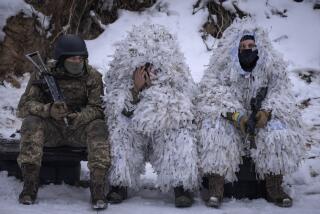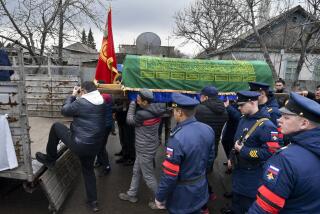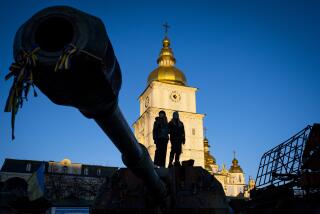Ethnic Discord : CHECHNYA : After Six Conflicts in Seven Years, Some Young Soldiers Say, ‘Enough!’
- Share via
GROZNY, Russia — Dmitri M. Markhasyov grew up in a family of intellectuals and, with his curly dark hair, pale complexion and lively olive-brown eyes, looks like a poet or an artist. But this thoughtful, diminutive young man wears military khakis and leads a company of Russian Interior Ministry troops in Chechnya.
He went to the best schools in Saratov, his hometown on the Volga River. But when his classmates went on to careers in academia or the diplomatic corps, Dima shocked family and friends by enrolling at the local Interior Ministry academy.
“Even now, I don’t know why I did it,” said Markhasyov, 24, a senior lieutenant in the ministry’s elite ODON Division. “You may call it romanticism. I didn’t want to do it the easy way, like everybody else.”
Now, like many of Russia’s best soldiers in this most troubling war yet of their careers, he has had enough.
The conflict with separatists in Chechnya is the sixth that Markhasyov and his colleagues have fought on the territory of the former Soviet Union in seven years. Before Chechnya, they battled guerrillas or disorderly crowds in Armenia, Azerbaijan, Uzbekistan and Abkhazia, and in fighting between North Ossetia and Ingushetia.
“They started using us in ethnic conflicts very early, even when we were still cadets,” Markhasyov said. “Every next conflict was worse than the previous one, and less and less of my romanticism remained.
“Then one misty morning it was all gone: in the Grozny airport on Jan. 25, when I saw a truck filled with the bodies of dead Russian soldiers.”
That image reminded him of the confusion of a mission that mixes police operations and all-out war. One of the ministry’s few Jewish officers, Markhasyov has decided to leave the service and emigrate to Israel.
“Who needs this war?” he asked. “Who profits from it? Who orchestrated this bloody nightmare?
“My heart is full of smoke,” he added in a near whisper, leaning over to throw more wood into the small rusty stove in the officers’ quarters--a third-floor room in a Grozny schoolhouse. “Even when I go to sleep, I hear gunfire in my dreams. And I am tired of rivers of blood.”
In the small quarters, four colleagues--sipping vodka and trying to ignore the late-night gunfire and shelling outside--listened in silence as Dima wondered aloud whether he had made the right choice.
Sergei, a captain from Belarus, suddenly announced that he too would soon quit. Vyacheslav, a major and an instructor at a St. Petersburg military academy, said he would try to spend more time teaching and less time fighting. Alexander, a major and the battalion commander, said he was looking hard at getting his law degree.
Only Vadim, a major in the special forces, said he would stay. “In combat, I feel (I am) in my element,” he said. “I’ll stay no matter what they pay me. I guess I’m crazy.”
Markhasyov excused himself to check on his troops. At the door he turned and said: “I don’t know what I will do in Israel. I am afraid they also need peacekeepers.”
More to Read
Sign up for Essential California
The most important California stories and recommendations in your inbox every morning.
You may occasionally receive promotional content from the Los Angeles Times.













